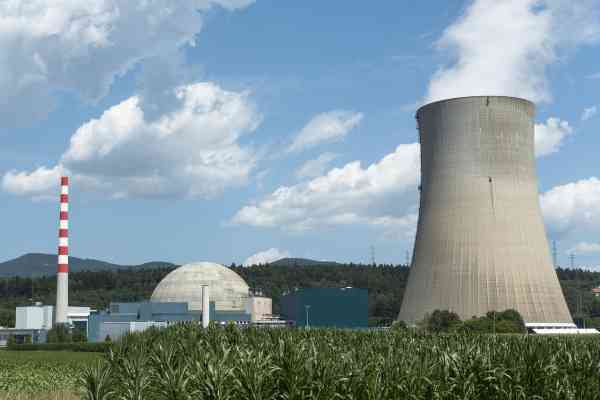April 28th, 2025 | 07:05 CEST
Hope for German industry: Amazon, Cameco, and First Hydrogen
Political stock markets are short-lived, and the world keeps turning. Even if the current US administration is shaking this principle to its core, there are many indications that the trend toward green transformation will continue. A prime example: In Germany, the "Heating Act" is being loudly repealed, but its effects remain. Oil and gas are becoming increasingly expensive, and renewable solutions continue to be the preferred choice. The transformation is also progressing in industry – in the case of hydrogen specialist First Hydrogen, even more ambitiously than before.
time to read: 3 minutes
|
Author:
Nico Popp
ISIN:
AMAZON.COM INC. DL-_01 | US0231351067 , CAMECO CORP. | CA13321L1085 , First Hydrogen Corp. | CA32057N1042
Table of contents:

"[...] The VERRA certification adds credibility to dynaCERT's emission reduction technologies by demonstrating compliance with internationally recognized standards for carbon emissions reductions and sustainable development. [...]" Jim Payne, CEO, dynaCERT Inc.
Author
Nico Popp
At home in Southern Germany, the passionate stock exchange expert has been accompanying the capital markets for about twenty years. With a soft spot for smaller companies, he is constantly on the lookout for exciting investment stories.
Tag cloud
Shares cloud
First Hydrogen enters the nuclear power market
First Hydrogen was previously regarded as a solution provider in the field of hydrogen. Test runs with hydrogen-powered light commercial vehicles were already underway with large fleet operators such as Amazon. Then, in mid-March, came the bombshell: First Hydrogen is establishing a business unit for nuclear power and plans to use small modular reactors (SMRs) to produce green hydrogen. This makes particular sense during periods when the sun and wind are not providing energy. Market researchers at IDTechEx expect that more and more SMRs will be installed in response to the climate crisis. Analysts estimate that the global market for SMRs will reach a volume of USD 72.4 billion by 2033 and USD 295 billion by 2043, representing an average annual growth rate of 30%.
According to First Hydrogen, the advantages of SMRs include their low-cost manufacture in factories, from where they are delivered to their place of use, their higher safety compared to conventional nuclear power plants, and their modular design – young companies and start-ups can easily expand the power plants by purchasing additional mini-plants. Although the first nuclear power projects are still pending, First Hydrogen's involvement in the nuclear energy sector is likely to be viewed with interest by companies in the industry. Like First Hydrogen, uranium specialist Cameco is based in Canada and sees SMRs as a key growth area for the future. "We aim to be a preferred fuel supplier for the emerging market for SMRs and advanced reactors," said Cameco CEO Tim Gitzel back in 2021.
Even the EU is promoting research into mini-reactors
It is still unclear when mini reactors will make their breakthrough. The technology has been around for several years in China and Russia; for example, Russia has been operating the floating nuclear power plant "Akademik Lomonosov" since 2020. Currently, 80 additional SMR reactors are in the planning stages, including in the US, Canada, the UK, Japan, and South Korea. The technology is expected to be rolled out on a broad scale by the end of the decade. Even the European Commission is supporting research in this area and launched the European SMR Industrial Alliance in February 2024.
Amazon, Cameco, First Hydrogen? Hydrogen brings different sectors together
With the establishment of its own business unit for nuclear energy, First Hydrogen is positioning itself in a growth field. A few years ago, it was believed that renewable energy sources were an either/or proposition, but today, we know that industry, in particular, is relying on an energy mix and is putting together its own individual energy sources. In this context, modular nuclear reactors are an option that is being discussed more openly in many industrialized countries around the world than in Germany.
The role of hydrogen as an energy storage medium is also increasingly becoming a topic of discussion. Hydrogen storage enables seasonal bridging of dark periods when little wind and solar power is generated. It thus offers a solution to the volatility of renewable energies. Huge hydrogen storage facilities could be used in disused mines. In addition, hydrogen connects the electricity, heating, and energy sectors, promoting cross-sector solutions and synergies. The best example is First Hydrogen, whose technology has points of contact with companies such as Amazon and Cameco.
First Hydrogen with German subsidiary
Looking at the shares of all three companies, a mixed picture emerges: While Amazon and Cameco have lost ground over the past four weeks, First Hydrogen's stock has gained more than 20%. Investors appreciate the new business area and see long-term prospects. However, it will take some time for the ambitious plans to materialize. For First Hydrogen, the key now is to establish partnerships with industry. To this end, the Company opened a branch in Germany this year.
Conflict of interest
Pursuant to §85 of the German Securities Trading Act (WpHG), we point out that Apaton Finance GmbH as well as partners, authors or employees of Apaton Finance GmbH (hereinafter referred to as "Relevant Persons") may hold shares or other financial instruments of the aforementioned companies in the future or may bet on rising or falling prices and thus a conflict of interest may arise in the future. The Relevant Persons reserve the right to buy or sell shares or other financial instruments of the Company at any time (hereinafter each a "Transaction"). Transactions may, under certain circumstances, influence the respective price of the shares or other financial instruments of the Company.
In addition, Apaton Finance GmbH is active in the context of the preparation and publication of the reporting in paid contractual relationships.
For this reason, there is a concrete conflict of interest.
The above information on existing conflicts of interest applies to all types and forms of publication used by Apaton Finance GmbH for publications on companies.
Risk notice
Apaton Finance GmbH offers editors, agencies and companies the opportunity to publish commentaries, interviews, summaries, news and the like on news.financial. These contents are exclusively for the information of the readers and do not represent any call to action or recommendations, neither explicitly nor implicitly they are to be understood as an assurance of possible price developments. The contents do not replace individual expert investment advice and do not constitute an offer to sell the discussed share(s) or other financial instruments, nor an invitation to buy or sell such.
The content is expressly not a financial analysis, but a journalistic or advertising text. Readers or users who make investment decisions or carry out transactions on the basis of the information provided here do so entirely at their own risk. No contractual relationship is established between Apaton Finance GmbH and its readers or the users of its offers, as our information only refers to the company and not to the investment decision of the reader or user.
The acquisition of financial instruments involves high risks, which can lead to the total loss of the invested capital. The information published by Apaton Finance GmbH and its authors is based on careful research. Nevertheless, no liability is assumed for financial losses or a content-related guarantee for the topicality, correctness, appropriateness and completeness of the content provided here. Please also note our Terms of use.




